Related Research Articles
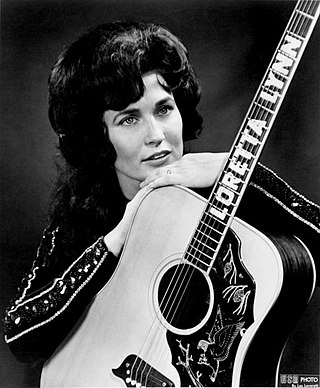
Loretta Lynn was an American country music singer and songwriter. In a career spanning six decades, Lynn released multiple gold albums. She had numerous hits such as "Hey Loretta", "The Pill", "Blue Kentucky Girl", "Love Is the Foundation", "You're Lookin' at Country", "You Ain't Woman Enough", "I'm a Honky Tonk Girl", "Don't Come Home A-Drinkin' ", "One's on the Way", "Fist City", and "Coal Miner's Daughter". The 1980 musical film Coal Miner's Daughter was based on her life.
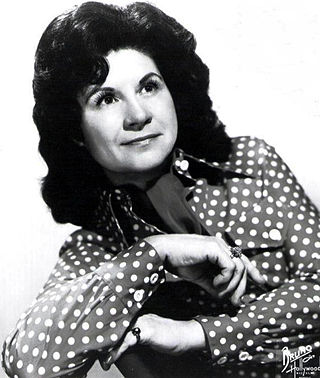
Ellen Muriel Deason, known professionally as Kitty Wells, was an American pioneering female country music singer. She broke down a barrier for women in country music with her 1952 hit recording "It Wasn't God Who Made Honky Tonk Angels", which also made her the first female country singer to top the U.S. country charts and turned her into the first female country superstar. “It Wasn’t God Who Made Honky Tonk Angels” would also be her first of several pop crossover hits. Wells is the only artist to be awarded top female vocalist awards for 14 consecutive years. Her chart-topping hits continued until the mid-1960s, paving the way for and inspiring a long list of female country singers who came to prominence in the 1960s.

Elizabeth Jane Anderson was an American country music singer-songwriter who was one in a wave of new-generation female vocalists in the genre during the 1960s to write and record her own songs on a regular basis. Writing in The New York Times Bill Friskics-Warren noted, "Like her contemporary Loretta Lynn, Ms. Anderson gave voice to female survivors; inhabiting their struggles in a soprano at times alluring, at times sassy."
This is a list of notable events in country music that took place in the year 1972.
"I Really Don't Want to Know" is a popular song written by Don Robertson (music) Howard Barnes (lyrics). The song was published in 1953.

"One's on the Way" is a song made famous by country music singer Loretta Lynn. Originally released in 1971, the song was the title track to her 1971 album and became one of her best-known hits. It was written by Shel Silverstein.

Don't Come Home a Drinkin' (With Lovin' on Your Mind) is the ninth solo studio album by American country music singer-songwriter Loretta Lynn. It was released on February 6, 1967, by Decca Records.

Singin' with Feelin' is the tenth solo studio album by American country music singer-songwriter Loretta Lynn. It was released on October 9, 1967, by Decca Records.
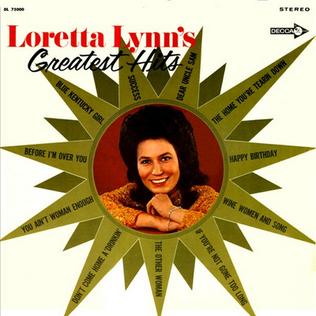
Loretta Lynn's Greatest Hits is a compilation album by American country music singer-songwriter Loretta Lynn. It was released on June 10, 1968, by Decca Records. The album is made up of Lynn's biggest hits from 1962 to 1967.
Peggy Sue Wright is a country music singer and songwriter, who had brief success as a country singer in the late 1960s. She is the middle sister of two popular country performers, Loretta Lynn and Crystal Gayle. Her older brother Willie "Jay" Lee Webb was a country music singer/songwriter in the 1960s.

Your Good Girl's Gonna Go Bad is a studio album by American country artist Tammy Wynette. It was released in May 1967 and contained ten tracks. The majority of the album was a collection of cover tunes Wynette recorded, including songs by George Jones, Loretta Lynn and Jeannie Seely. Several new songs were also part of the project. It was the debut studio album of Wynette's career and included two singles: "Apartment No. 9" and "Your Good Girl's Gonna Go Bad". The latter became Wynette's first chart success, climbing into the top five of the American country chart. The album itself reached the American country LP's chart in 1967. The album later received a positive review from AllMusic, which gave it a five-star rating.
"I Don't Wanna Play House" is a song written by Billy Sherrill and Glenn Sutton. In 1967, the song was Tammy Wynette's first number one country song as a solo artist. "I Don't Wanna Play House" spent three weeks at the top spot and a total of eighteen weeks on the chart. The recording earned Wynette the 1968 Grammy Award for Best Female Country Vocal Performance. The song was released in the UK in 1976 and made the Top 40.
"Blue Kentucky Girl" is a song written by Johnny Mullins, and originally recorded by American country music artist Loretta Lynn. It was released in May 1965 as the first single and title track from the album Blue Kentucky Girl. The song reached number 7 on the Billboard Hot Country Singles & Tracks chart.
Willie "Jay" Lee Webb was an American country music singer. He is known for his 1967 song, "I Come Home A-Drinkin' ", which was written as an "answer song" to his older sister Loretta Lynn's No. 1 1967 hit "Don't Come Home A Drinkin'".
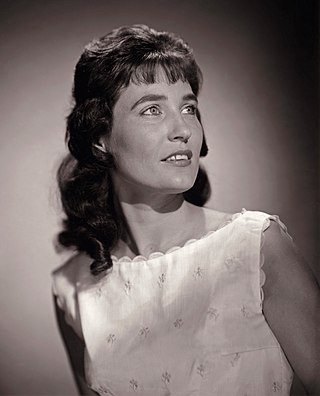
American country artist Loretta Lynn released 86 singles, two B-sides and 14 music videos. Her debut single was "I'm a Honky Tonk Girl" (1960) via Zero Records. Promoting the song with her husband by driving to each radio station, the effort paid off when it peaked at #14 on the Billboard Hot Country Songs chart. Arriving in Nashville, Tennessee, that year, she signed a recording contract with Decca Records. In 1962, "Success" reached the sixth position on the country songs chart, starting a series of top ten hits including "Wine Women and Song" and "Blue Kentucky Girl". She began collaborating with Ernest Tubb in 1964 and recorded four hit singles with him, including "Mr. and Mrs. Used to Be". Lynn's popularity greatly increased in 1966 when she began releasing her own compositions as singles. Among the first was "You Ain't Woman Enough " which reached the second position on the country songs list. She then reached the number one spot with "Don't Come Home A-Drinkin' " (1967). This was followed by "Fist City" (1968) and "Woman of the World " (1969).

The discography of American country music singer-songwriter Loretta Lynn includes 50 studio albums, 36 compilation albums, two live albums, seven video albums, two box sets and 27 additional album appearances. Briefly recording with the Zero label, she signed an official recording contract with Decca Records in 1961, remaining there for over 20 years The first under the label was her debut studio album Loretta Lynn Sings (1963). It peaked at number two on the Billboard Top Country Albums survey. Lynn would issue several albums a year with her growing success, including a duet album with Ernest Tubb (1965), a gospel album (1965), and a holiday album (1966). Her seventh studio album You Ain't Woman Enough (1966) was her first release to top the country albums chart and to chart within the Billboard 200. Other albums to reach number one during this period were Don't Come Home a Drinkin' (1967) and Fist City. Don't Come A'Drinkin would also become Lynn's first album to certify gold by the Recording Industry Association of America (RIAA).
"Lyin', Cheatin', Woman Chasin', Honky Tonkin', Whiskey Drinkin' You'" is a song written by Gene Dobbins and Pat McManus. It was originally recorded by American country artist Loretta Lynn. It was released as a single in May 1983 and became a minor hit on the Billboard country chart that year. It was the first single issued from her 1983 studio album.
"Walking with My Memories" is a song written by Fred Koller and Mike Pace. It was originally recorded by American country artist Loretta Lynn. It was released as a single in October 1983 and became a minor hit on the Billboard country chart that year. It was the second single issued from her 1983 studio album.
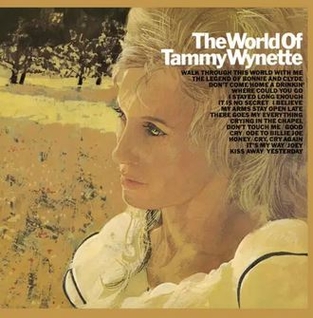
The World of Tammy Wynette is a compilation album by American country artist Tammy Wynette. It was released in May 1970 via Epic Records and contained 20 tracks of previously recorded material. The album comprised a series of recordings that originally appeared on Wynette's studio albums but were not issued as a singles. Some of the album's material were covers of songs first recorded by other music artists. It was originally issued on two separate discs and was later re-released in 2009. The World of Tammy Wynette appeared on both the Billboard country albums chart and the pop chart. The disc received mixed reviews from critics.
References
- ↑ Whitburn, Joel (2004). The Billboard Book Of Top 40 Country Hits: 1944-2006, Second edition. Record Research. p. 209.
- ↑ Whitburn, Joel (2004). The Billboard Book Of Top 40 Country Hits: 1944-2006, Second edition. Record Research. p. 209.
- ↑ "The 200 Greatest Country Songs of All Time". Rolling Stone . May 24, 2014.
- ↑ Kent, David (1993). Australian Chart Book 1970–1992 (illustrated ed.). St Ives, N.S.W.: Australian Chart Book. p. 183. ISBN 0-646-11917-6.